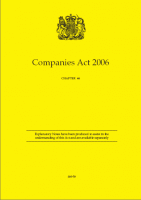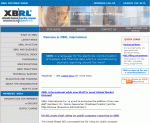 Gordon Brown’s love of bondage is well known to all UK voters. He used to boast in Parliament how he’d snuggle up to the dominatrix Prudence and do whatever she asked, so long as she’d eliminate boom and bust.
Gordon Brown’s love of bondage is well known to all UK voters. He used to boast in Parliament how he’d snuggle up to the dominatrix Prudence and do whatever she asked, so long as she’d eliminate boom and bust.
Now Prudence has been kissed goodbye, her siren whispers left behind as conveniently as any thought of limiting public debt in line with domestic GDP.
It’s a salutary lesson in being so cock-sure of yourself that you forget that life has a remarkable way of turning out differently to how you envisage.
So I thought I’d do a little self examination. There have been several posts on this blog which have concluded along the lines of “business really has to pull its finger out otherwise governments will legislate”.
But would legislation be such a bad thing?
The Sustainability Legislation Agenda Has Begun
There is already substantial sustainability legislation on the statute books in the EU, with the USA appearing to be likely to follow the same course.
The UK Companies Act (2006), which reflected an EU Directive, brought in several important non-financial regulations. These included:
- any director of any company, large or small, must have regard for “the impact of the company’s operations on the community and the environment”
- a quoted company must include in its Business Review information about “the impact of the company’s business on the environment … the company’s employees, and social and community issues”
- the Business Review must also contain analysis, as appropriate, of “environmental … and employee matters”
For the first time companies have to focus on something other than shareholder value and financial performance.
These regulations won’t directly change corporate behaviour, but by introducing some degree of transparency to corporate sustainability it has led to a flurry of accusations and rebuttals over greenwashing.
Flaws In The Current Legislation Framework
The best way to ascertain the veracity of such claims and counter claims is through introducing a form of independent assurance: auditing, in plain terms.
In the UK, company auditors currently have a duty to report whether the company’s Annual Accounts give “a true and fair view” of the company’s financial situation.
However they need only consider whether the Directors’ Report (which includes the Business Review) is consistent with those accounts, not how accurate the report is in a wider context.
While this regulatory mismatch between what must be reported and what must be audited remains it could be turned into a very large loophole for corporate greenwashers, bringing the whole framework of sustainable business in the UK into disrepute.
GAAP – A Lesson From Past Audit Legislation
Such criticism will serve to bring sustainability issues to a wider audience and so will increase its political importance. The recent Primark / TNS Knitwear sweatshops controversy is a case in point.
And once an issue becomes a political football regulation, in one form or another, is inevitable as parties seek to outbid one another. This is not dissimilar to how financial auditing began.
During the Great Depression, the American Institute of Accountants adopted five “Generally Accepted Accounting Principles” (GAAP), to give certainty of companies’ financial health.
However GAAP did not become a statutory requirement until a few years later, when the Securities and Exchanges Commission wanted to make business comparability compulsory and decided to use the best common practice as its foundation.
This decision boosted the US economy as the 1930s unfolded, leading to increased investor confidence in companies’ financial viability.
The same situation has arrived once again, with companies needing to work ahead of the legislative curve to ensure future assurance standards will support businesses without becoming a burden.
How Websites Promote Transparent Sustainability Assurance
Websites are a natural place for this evolution in assurance to begin. They are a relatively informal means of communication and allow interaction with many different stakeholders at the same time.
The growing trend for companies to publish their annual reports in HTML is a good place to start. This allows the normally dry content of a Business Review to be interwoven with more in depth information from elsewhere on the site.
For instance, linking employee considerations to the careers section, or talking about environmental and community issues for any operational expansion or contraction.
This in turn can allow the company to start moving informally towards an assurance standard when producing this additional content, perhaps in preparation for a formal move towards a particular standard at a later date.
XBRL – Sustainability Legislation Writ Large
Another area which websites can exploit to great effect is in the online analysis and mining of a company’s underlying figures. There are several examples of this available, one of the most well known being BP.
The scope of such online analytical packages is about to explode. From summer 2009 large US companies have to file their accounts using XBRL, with smaller ones following in 2010 & 2011.
This could lead to a whole swathe of additional functionality for a corporate website: comparison to competitors’ figures, for example, or publishing environmental figures alongside financial ones to allow value-added analysis to take place.
Making Websites Promote Sustainability Assurance
Ultimately, it is not a question of whether sustainability legislation will arrive or not. It already has and nearly all EU and US commentators expect it to increase over the coming years.
It’s more a question of how companies can react to this coming wave and help to shape future legislation about sustainability assurance. The best way to address this for companies to look at how they report and manage their own sustainability data, and the best place to innovate and take the lead is on their website.
Picture credit: Gordon Brown – World Economic Forum Annual Meeting Davos 2007 by World Economic Forum from flickr under Creative Commons Attribution Share Alike License.
Lucy is Editor at Corporate Eye



Mostly agree. More regulation will come and will be needed – though, it is not the silver-bullet either.
And also a correction re. the UK requirements in 2006 companies act to be transparent on CR matters and directors’ responsibility to consider wider issues: in the context of UK corporate law and the companies act in particular, these requirements should be seen through the perspective of promoting shareholder value. It mandates ‘enlightened shareholder value’. But in case of conflicting value, e.g. between environment or employees, shareholder value takes precedence – so, this also means that what must be reported in the annual report has to be seen in light of this more narrow perspective. This is still a clear improvement, but not as radical as many CR proponents and social activists believe it to be…
Thank you once again for your contribution Leon, and for the correction. You’re right: that paragraph could have been phrased much better.
In terms of radicalism, I think the provisions in the Companies Act for small shareholders to sue the board (where before, realistically, only the board could sue itself) are at the top of the list.
However, this is all just the start of the future and you’re quite right to say that legislation is not the silver bullet.
What happens next is anyone’s guess, though if anyone would care to crystal-ball gaze in public then your comments are welcome below!
Hi Chris,
Hope you get this post – over a year later!
I am trying to understand what additional transparency would have been required for banks and nominee shareholders after the Companies Act 2006. For example, if a bank is a nominee shareholder in a limited company, would the new Act mean they had to disclose their ownership in limited companies?
Hope you can help with this query.
Many thanks
Nikki
Hi Nikki …
Thank you for getting in touch!
As far as my understanding of the Companies Act goes (which is, I emphasise, very limited!), banks do not have to declare those companies within which they hold nominee shares.
Hope this helps
Chris.